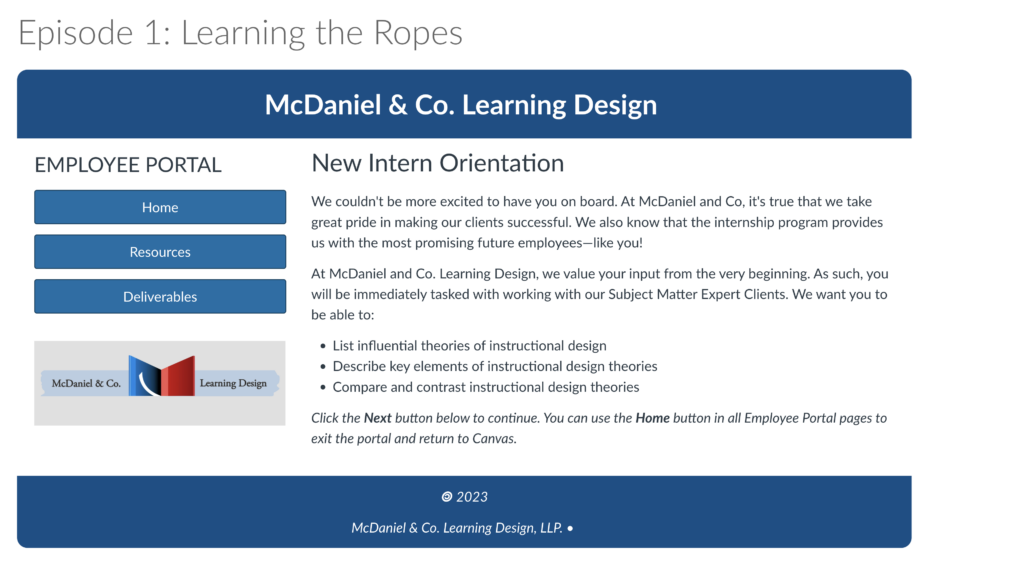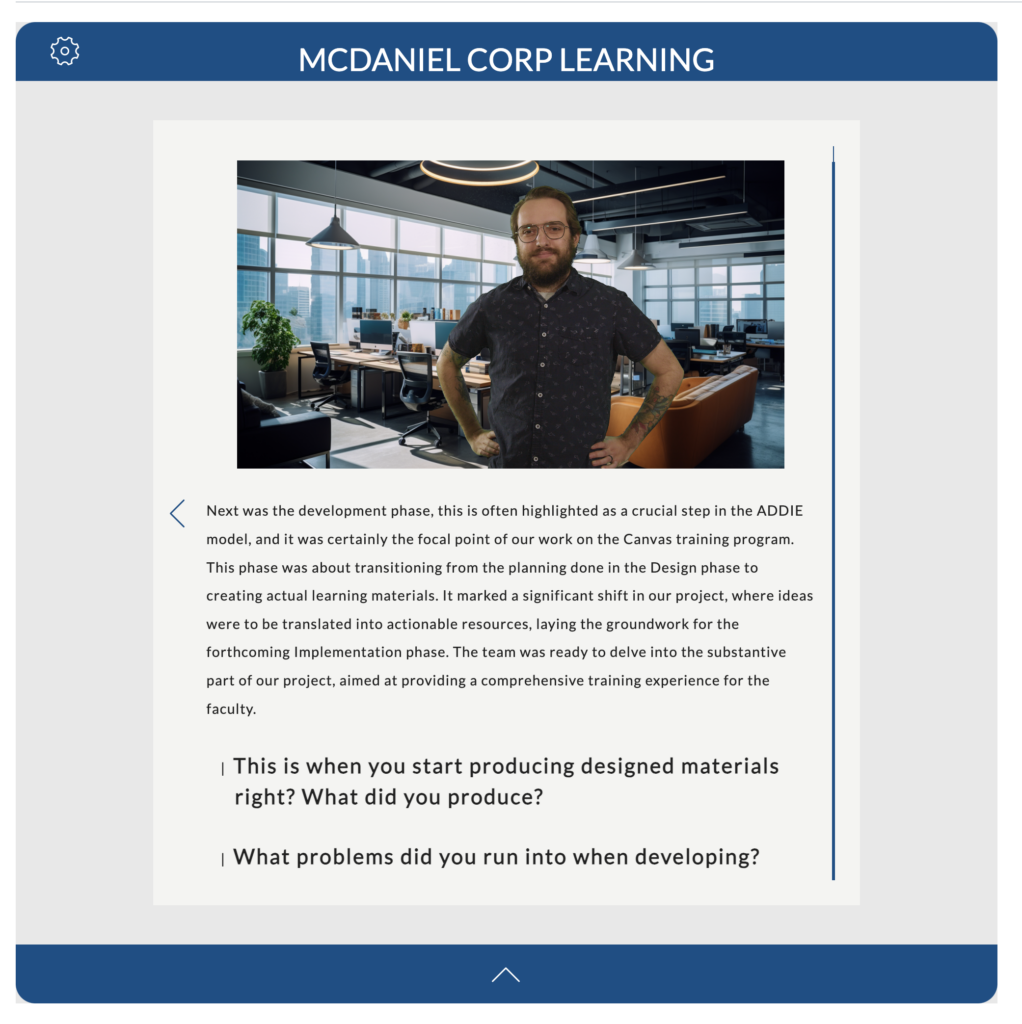Last updated on June 3, 2024
By Michael Rupert, Alexandra Grima, Will Austin, Sarah Creasy, Nate Easley III, Todd Wolfe, and Alex McDaniel
During the fall 2023 semester, instructor Alex McDaniel and Innovative and Lifelong Learning partnered with the CTLD Instructional Design team to create “Foundations of Instructional Design,” a self-paced, online course that can be finished in 8 weeks or less that presents a unique opportunity to cultivate students’ skills in instructional design.
This course is all about learning by doing. Students make decisions, explore different outcomes, and see firsthand the consequences of their choices. It’s not just about viewing lectures; it’s about actively participating in the work instructional designers do daily. Foundations of Instructional Design is a stackable course, and in addition to the noncredit portion, there’s a credit-by-exam component, which takes learners on a deeper journey into the practical application of instructional design thinking.
Contents
Course Showcase Video
Showcase Examples
Promo Video
Watch the short trailer below to learn more about this unique course!
Course and LMS Theming

Canvas is a powerful learning management system (LMS), but that power can be constraining, causing course after course to have the same user interface and experience. Foundations of Instructional Design changes this paradigm. Learners become interns for McDaniel & Co. Learning Design. CTLD instructional designers created a fully themed, immersive employee portal within Canvas. Learners interact with this interface to retrieve materials, have chats with coworkers, and submit deliverables, just like in the professional world. This makes instructional design more engaging and more memorable. Foundations of Instructional Design looks nothing like any other course offered at MSUD.
Interactive Twine Simulations

Like other courses, Foundations of Instructional Design features assessments that give learners opportunities to show what they know and how they understand; however, in addition to carefully hiding and re-framing the usual assessment tools in Canvas, CTLD offers learners new opportunities to check their knowledge, make choices, and receive instant feedback–even in a self-paced online course. This is accomplished by including simulated scenarios created using the software Twine. These experiences help draw learners into the McDaniel Corp world, placing them in situations that mimic real-world issues in instructional design. Learners’ choices impact these scenarios as they progress, reinforcing skills learned through course materials.
Instructor and ID Presence


Foundations of Instructional Design transformed from a conventional SPO (Self-Paced Online) course to an engaging self-paced journey featuring learning paths that guide users through instructional design choices. Collaborating seamlessly, the CTLD instructional design team and instructional media developers crafted a visually immersive office space, placing learners as interns within a fictional instructional design firm. Throughout the course, learners engage with non-player characters (NPCs) and their “boss,” Mr. McDaniel, fostering a dynamic environment to gain knowledge and experience. Despite the self-paced nature of the course, interactions with peers are intentionally limited, replaced by compelling NPC videos and interactive assignments, fostering a sense of personal engagement.
Early on, learners encounter their mentor, Alex McDaniel, extending a welcome to the course and their virtual “internship.” As they delve into the realm of instructional design thinking, Alex, alongside his identical twin, Earl, provides insights into topics such as ADDIE, Dick and Carey, Andragogy vs. Pedagogy, TPaCK, and more. The course strategically integrates multiple opportunities for learners to engage with virtual colleagues, allowing for “collaboration” in decision-making processes. Each choice prompts real-time feedback, empowering learners to refine their skills and elevate their decision-making prowess. The integral role of instructor presence is pronounced throughout the course, in various settings.”
Alongside the boss, several other members of the firm—Michael, Alex, Will, and Sarah—bring a wealth of instructional design experience to enrich the learning journey.




Every element of Foundations of Instructional Design, from its interactive assessments to the virtual mentorship of Alex McDaniel and his team, is designed to foster a deep, practical understanding of instructional design. Whether participants explore the course for its noncredit benefits or seek to deepen their expertise through the credit-by-exam option, Foundations of Instructional Design sets a new standard for instructional design engagement and practical application.
For more information about this unique learning experience, please visit Innovative and Lifelong Learning’s Career Launchpad.
Partnering for Continuous Improvement in Teaching and Learning
A significant factor in the success of this and similar projects is the support and funding from the Office of Online Learning (OOL), which has been instrumental in enhancing the quality of our online educational endeavors. OOL’s support and contributions have empowered faculty members to innovate and create a more enriching educational environment for all. Please visit the Office of Online Learning for more information about all that they are doing to help MSU Denver faculty members and students.
Want to get involved?
One way to find help with implementing student support in your course is the CTLD Course Development Cycle. This is an intensive but rewarding process where an instructional designer will work with you over several months to identify course objectives, develop learning activities, create a user-friendly course, record high-quality multimedia content, and much more.
Our instructional designers will help you build student support and implement them in your course. As compensation for the time and effort you spend developing your course, faculty are offered a $5,000 stipend for completing the development cycle. For courses that use OER, MSU Denver offers additional incentives.
For more information on the CTLD Development Cycle and how to apply to join, please read our CTLD Course Development Cycle spotlight.